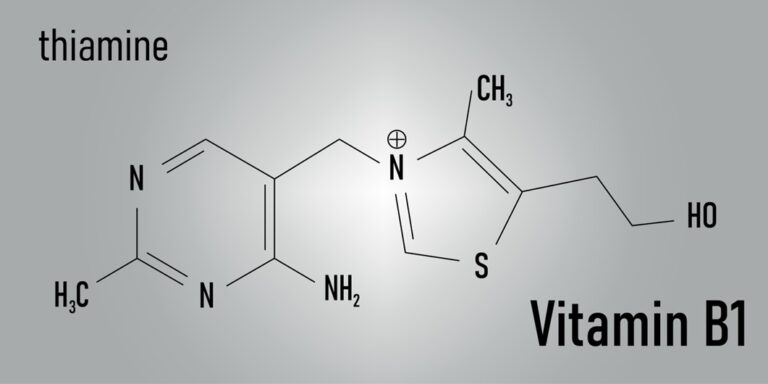Vitamin B1 – Thiamine

Are you ready to get started on the vitamins?
I’m going to start with the water-soluble vitamins, specifically the B vitamins because there are so many things to talk about that can help improve your health easily and dramatically.
Let’s start at the very beginning with Vitamin B1!
Vitamin B1, also known as Thiamine, is the first vitamin to be found and isolated in 1926.
Thiamine is metabolized in the small intestine, like many of our other vitamins. Because it is water-soluble you need to have it daily either from food or in a supplement because it will not stay in the body long.

Why is Thiamine needed?
The number of body processes that Thiamine is involved in is long but very important. The following list is not exhaustive:
- It is critical in the metabolism of carbohydrates, amino acids and fatty acids helping the body convert the above to proteins, hormones and enzymes that are needed daily.
- It improves energy production
- It decreases inflammation in the respiratory system
- It improves muscle strength
- It is necessary for cognitive function
- It elevates moods
- It regulates blood sugar and cholesterol
- It prevents cataracts
- It improves healing
- It is imperative for the Central Nervous System where It helps the brain memory, focus, and improved moods
- Improves digestive processes
- Improves blood sugar balance especially in people with diabetes.
- It improves healing from burns and injuries
Thiamine is a critical nutrient for our bodies!
Thiamine deficiency is relatively rare, however low thiamine levels are getting increasingly common due to our lifestyles.
Here are the most common inhibitors of vitamin B1:
- Alcohol is thought to be the primary block of vitamin B1
- A diet high in fats and sugar
- Food preservatives especially sulfites and nitrites
- Antacids (think Tums, Rolaids)
- Acid blockers such as Prilosec
- Most blood pressure medications
- Many antibiotics
- Birth control pills
- High estrogen
- Crash diets
- Heat in cooking or processing especially moist heat
- I hate to mention good foods but if you eat a ton of blueberries, Brussels sprouts or red beets this has an effect on Thiamine
- High intake of tea
Between being a water-soluble vitamin and having so many things that interfere with the uptake and metabolism of thiamine, you can see how our modern-day living could affect our levels.

What Does Low Thiamine Look Like?
Adding to that, the medical community is not well versed in signs and symptoms of vitamin deficiencies especially ones like Thiamine. It is not on their radar to check these labs even though there are more and more studies showing that Vitamin B1 can be one of the easiest remedies for many symptoms.
So, what are the symptoms of low thiamine?
- Fatigue
- Memory loss
- Headache
- Confusion or brain fog
- Depression
- Anxiety and stress
- Insomnia
- Muscle weakness
- Constipation
- Eye pain
- Decreased appetite
- Numbness in the extremities or feeling of pins and needles
Do any of these things feel like they fit for you??
How Do I Increase Vitamin B1 in My Diet??
While you can easily take a supplement for thiamine, there are a lot of good foods that can improve your intake of vitamin B1.
- Beef, poultry, lamb, pork
- Fish especially trout, salmon and tuna
- Legumes
- Dark green leafy vegetables
- Asparagus
- Romaine lettuce
- Eggs
- Mushrooms
- Nuts and seeds
- Whole wheat
- Brewer’s Yeast
Just remember that heat, especially moist heat like boiling, will dramatically decrease the amount of usable thiamine.
How Much Thiamine Do I Need?
The thing about Thiamine is it could be one of the easiest, cheapest ways to improve how you feel. It is very difficult to overdose on Vitamin B1 and the return is great!
The recommended daily allowance of Vitamin B1 is 5 – 10 milligrams a day. This is for healthy individuals who aren’t having the symptoms that you read earlier.
If you are taking any of the medications that we talked about, you need at least 25 – 50 milligrams per day.
But let me tell you what the studies have shown…
There have been quite a few studies since the late 1990s that those suffering with depression, anxiety, and high stress feel much better on a dose of at least 100 milligrams a day. The improvement in emotions did not take long in most of these studies with people feeling better sometimes within a week but most within four weeks.
Alcohol is one of the biggest inhibitors of vitamin B1. Even light drinking can lead to low levels of Thiamine. When you have increased alcohol intake, you need between 100 and 250 milligrams daily.
Because Vitamin B1 has a great effect on muscles, scientists have found that increased doses of it help improve cardiovascular function. Think about it… the heart is a muscle and if Vitamin B1 helps reduce muscle weakness then it is critical to our hearts. Recent studies have shown that supplementation of Thiamine in the amounts of 100 to 200 milligrams help improve those with heart disease.
A recent study showed that supplementation of Vitamin B1 improved the rates of neuropathy and retinopathy for those who have diabetes. This isn’t the first of its studies. Scientists have been studying the role of thiamine and diabetes since 1990s. They have found that Thiamine not only reduces the nerve effects of diabetes, but also aids in the metabolism of glucose, weight loss and metabolic function. All the studies agree that Thiamine is a critical ingredient to the health of those with diabetes.
Thiamine has also been proven to help with the elderly. Vitamin B1 deficiency is common in this age group and it leads to increased cognitive decline. Recent studies however have found that treatment with B1 helps slow the progression of Alzheimer’s Disease and improve cognitive function.
Finally, Vitamin B1 has been shown in many studies to help with diseases that come with aging beyond Alzheimer’s. Research has shown that increased thiamine helps prevent cataracts, macular degeneration, heart attacks, and stroke.
How Should I Take Vitamin B1/Thiamine?
The most active form of thiamine is found in foods but in reality, most of us would benefit from a supplement.
For those doing injections, the B-complex that I prescribe has Thiamine in it.
When looking at a supplement, the most effect form of B1 is benfotiamine which is actually a fat-soluble derivative of Thiamine. It helps with the absorption of Thiamine salts and gives the body the time and ability to absorb as much of the vitamin as possible.
I recommend for most people a daily supplement dose of 100 – 200 milligrams taken in the morning.
I don’t know about you, but I want to feel as good as I can for as long as I can as I age….and have the brain to go with it. Thiamine is one of those things that can help!
References
Beltrano, Mazzeo & Porta. (2021). Thiamine and diabetes: back to the future?
Bland, J et al.(2004). Clinical Nutrition: a function approach.
Cohen, S. (2011). Drug Muggers. Rodale
Linus Pauling Institute. (2024). Thiamin. lpi.oregonstate.edu
Polegato et al. (2019). Role of Thiamin in Health and Disease.

You May Also Like

Make Nutrients Work for You
May 13, 2024
Wholism in Healing
May 8, 2024
One Comment
Karen Unrue
Thank you Sarah,
That was very informative